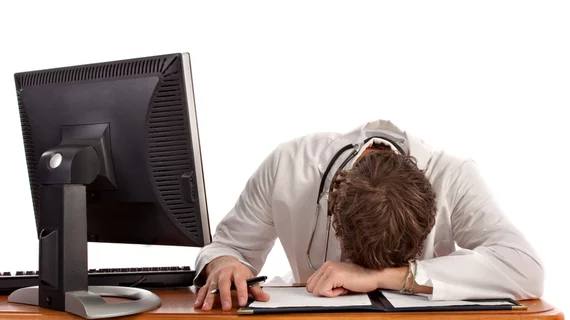Only 25% of radiologists are happy at work, survey finds
Radiologists are mildly happy at work compared to other physician specialties, according to Medscape’s 2019 Radiology Lifestyle, Happiness & Burnout Report, with only 25 percent claiming to be "very or extremely happy" in the workplace.
Medscape surveyed more than 15,000 physicians spanning 29 specialties for their annual report released in January. Their radiology-specific report was published Feb. 20, and in it, radiology ranked 20th among all specialties in terms of workplace happiness. Infectious disease specialists and anesthesiologist ranked alongside radiologists. Plastic surgeons and preventative health specialists were most happy at work, while internal medicine, emergency medicine and rehabilitation specialists rounded out the bottom.
Perhaps unsurprisingly, all physicians were generally happier outside of work, including slightly more than half of all radiologists. Again they ranked in the middle of the pack, coming in at 16th among all specialties for being either very or extremely happy outside of work. For comparison, orthopedics, family medicine and OB/GYNs all reported similar happiness levels when they left the office.
Nearly half of all radiologists surveyed reported feeling burned out—on par with that seen in physicians overall. Additionally, 11 percent were colloquially depressed, while 4 percent were clinically depressed.
What accounts for the high burnout rates? According to Medscape it’s “spending too many hours at work,” with 48 percent of radiologists citing long hours as the top contributor to burnout. The specialty also felt a lack of respect from administrators and staff heavily contributed to burnout along with “feeling like just a cog in a wheel,” which was cited by 44 percent and 37 percent of respondents, respectively.
A little more than half of the radiologists who felt depressed claimed their feeling had no effect on patient interaction, but of those who acknowledged their depression affected care, 32 percent claimed they made errors they might not make otherwise. According to the survey, 46 percent of depressed radiologists felt more easily exasperated with their peers, and 31 percent expressed that frustration in front of staff. A mere two percent expressed such frustrations in front of patients.
A majority of radiologists don’t seek help for their depression or burnout, which, according to the report, could be due to a rationalization of their exhaustion. In fact, 67 percent said they are not likely and never have sought help, while 10 percent said they were currently seeking some form of professional aid. Radiologists were largely split on whether they would participate in a workplace program to reduce burnout. Twenty-four percent were unlikely, while 10 percent claimed they were likely to participate.
If a majority of radiologists don’t seek help, how does the specialty cope with burnout? Sixty-two percent take five weeks of vacation or more compared to 23 percent of physicians overall. A majority of radiologists (38 percent) exercise two to three times per week and 24 percent workout four to five times a week. To compare, among all physicians, 35 percent exercise at least four times a week and just over one-third exercise two to three times a week.
Medscape’s survey included 15,069 physicians polled from July 27 through October 16, 2018. Four percent of those respondents were radiologists and majority (62 percent) were men.

